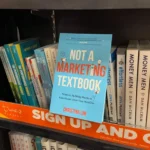Artificial intelligence (AI) has moved from buzzword to boardroom, now playing an integral role in how brands connect and communicate. According to Pallavi Misra, Marketing & Communications Director at Mozaic Communications, AI is not replacing creativity—it’s enhancing it. With deep experience across the Asia Pacific and a passion for integrated campaigns, Pallavi Misra sees AI...
RELATED ARTICLES
© NewInAsia.com 2025








